|
|
|
Sort Order |
|
|
|
Items / Page
|
|
|
|
|
|
|
| Srl | Item |
| 1 |
ID:
157785
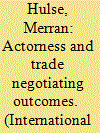

|
|
|
|
|
| Summary/Abstract |
In 2014, the EU concluded Economic Partnership Agreements (EPAs) with several African, Caribbean and Pacific (ACP) regions. These EPAs represent some of the most advanced examples of interregional cooperation. Yet, the outcomes of EPA negotiations are not the same across all regions. This article investigates differences in negotiated outcomes and argues that regional actorness – the ability of regions to become identifiable, to aggregate the interests of member states, to formulate collective goals and to make and implement decisions – influences regions’ ability to navigate interregional trade negotiations. In a comparison of the actorness and negotiated outcomes of West Africa and the SADC EPA Group, the article shows that actorness matters for international negotiations: regions with higher levels of actorness can negotiate better outcomes even under conditions of stark power asymmetry.
|
|
|
|
|
|
|
|
|
|
|
|
|
|
|
|
| 2 |
ID:
173224
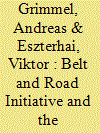

|
|
|
|
|
| Summary/Abstract |
This article examines how states may be inclined to adapt to the policy goals of powerful economic partner states in acts of ‘anticipatory conformity’ or by adjusting their ‘common’ policy goals. It builds on two classical theoretical bases—the concept of economic statecraft and Hirschmanesque effects—to explore how economic power may be translated into far-reaching effects on other states’ behaviour without a clear goal or objective being proclaimed or even set by the economically powerful state. Our empirical findings suggest that the European Union still has an unparalleled influence on member states, and China’s growing economic presence in Europe alone—especially in the framework of the Belt and Road Initiative—is insufficient to influence member states’ politics.
|
|
|
|
|
|
|
|
|
|
|
|
|
|
|
|
| 3 |
ID:
105163
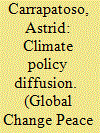

|
|
|
|
|
| Publication |
2011.
|
| Summary/Abstract |
National climate change policies are becoming similar, which can be interpreted as being a result of policy diffusion processes. Many of those policies are inspired by EU climate strategies. The EU actively promotes these policies in its external relations, such as in its partnership on climate change with China. This leads us to three sets of questions. Does the EU act as a transformative power in interregional cooperation on climate change? Can we identify a climate change policy diffusion process in EU-Chinese relations, and, if so, which communication channels as well as diffusion mechanisms can be identified? And, finally, is interregional cooperation on climate change a building block or a stumbling block in the global climate change regime? This article argues that the policy diffusion process depends on the scope of the interregional communication process between the EU and China, and the willingness and national responsiveness of China to adopt policy innovations.
|
|
|
|
|
|
|
|
|
|
|
|
|
|
|
|
| 4 |
ID:
155692
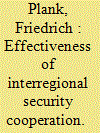

|
|
|
|
|
| Summary/Abstract |
African Union (AU)–European Union (EU) interregional security cooperation has not so far been analysed systematically with regard to its effectiveness despite the substantial support of African capacity building by the EU and joint peacekeeping of the partners. Assessing AU–EU cooperation in the Central African Republic (CAR), this paper examines to what extent and under which conditions EU–AU efforts are effective. Concerning the dependent variable, the presented conceptualisation of effectiveness includes both internal (goal attainment) and external (problem-solving) perspectives. The independent variable draws on two strands of literature that barely speak to each other: interregionalism and inter-organisationalism. It focuses on the conditions of effectiveness which include both internal (RO-specific) and interregional factors. The findings suggest that AU–EU engagement in the CAR was effective in the medium term. Strong incentives of the partners, the French leading role and the convergence of the partners are identified as factors conducive to a medium to high effectiveness of the engagement.
|
|
|
|
|
|
|
|
|
|
|
|
|
|
|
|
| 5 |
ID:
159171
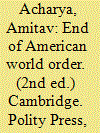

|
|
|
|
|
| Edition |
2nd ed.
|
| Publication |
Cambridge, Polity Press, 2018.
|
| Description |
xvii, 217p.pbk
|
| Standard Number |
9781509517084
|
|
|
|
|
|
|
|
|
|
|
|
Copies: C:1/I:0,R:0,Q:0
Circulation
| Accession# | Call# | Current Location | Status | Policy | Location |
| 059395 | 327/ACH 059395 | Main | On Shelf | General | |
|
|
|
|
| 6 |
ID:
093889
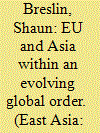

|
|
|
|
|
| Publication |
2010.
|
| Summary/Abstract |
The papers in this special edition are a very small selection from those presented at the EU-NESCA (Network of European Studies Centres in Asia) conference on "the EU and East Asia within an Evolving Global Order: Ideas, Actors and Processes" in November 2008 in Brussels. The conference was the culmination of three years of research activity involving workshops and conferences bringing together scholars from both regions primarily to discuss relations between Europe and Asia, perceptions of Europe in Asia, and the relationship between the European regional project and emerging regional forms in Asia. But although this was the last of the three major conferences organised by the consortium, it in many ways represented a starting point rather than the end; an opportunity to reflect on the conclusions of the first phase of collaboration and point towards new and continuing research agendas for the future.
|
|
|
|
|
|
|
|
|
|
|
|
|
|
|
|
| 7 |
ID:
079131
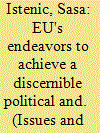

|
|
|
|
|
| Publication |
2007.
|
| Summary/Abstract |
Regionalism and interregionalism have become tools for diplomacy in the post-Cold War era. Successful European integration has heightened the European Union's (EU) desire to become a more effective global actor in international security. The Taiwan Strait is one of the most dangerous flash-points which might trigger a war in Asia. Escalation of the crisis in the Taiwan Strait would undeniably have severe economic, political, and perhaps even military implications for the EU. In the light of the EU's emerging regionalism with East Asia and its efforts to achieve a discernible political and security role in the region, there is an increasing awareness in the EU of the need for it to develop its own security perspective on China and to form its own approach toward the contentious cross-Strait issue
|
|
|
|
|
|
|
|
|
|
|
|
|
|
|
|
| 8 |
ID:
082784
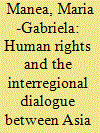

|
|
|
|
|
| Publication |
2008.
|
| Summary/Abstract |
Since the early 1990s, human rights have been a contentious issue for relations between the Association of Southeast Asian Nations (ASEAN) and the European Union (EU), especially in the Asia-Europe Meeting (ASEM). It is an issue that has constantly led to tensions in interregional cooperation. However, the ASEAN-EU dialogue on human rights has, in fact, had a significant impact on regional dynamics by stimulating the process of regional identity formation, especially in Southeast Asia. The core mechanism through which this development takes place is that of interaction, the process in which the two regional groupings engage while negotiating human rights policy. It can be argued, therefore, that interregional and intraregional human rights interactions are mutually dependent. ASEAN's rather confrontational mode of interaction with the European Union in relation to human rights has served as a catalyst for the dynamic growth of a collective definition of self in ASEAN. It has led to an 'essentialization' of ASEAN's idea of self as opposed to a common other, something which has undermined the possibility of maintaining an interregional dialogue that is not confrontational. However, it has also contributed to the development of a regional space for communicating about human rights and has thus played a central role in the gradual transformation of ASEAN's collective identity formation.
|
|
|
|
|
|
|
|
|
|
|
|
|
|
|
|
| 9 |
ID:
093892
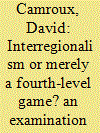

|
|
|
|
|
| Publication |
2010.
|
| Summary/Abstract |
It is argued in this paper that the normative nature of both the conscious and unconscious attempts of the European Union as a 'civilian power' to export its model of regional integration elsewhere, has led to the claim that an ostensibly new form of interaction in international relations - one characterized as interregionalism - has emerged. An examination of the EU-ASEAN relationship, however, would suggest that this assertion is greatly exaggerated. Between conventional bilateral relations, between individual EU members and individual Southeast Asian nations, and forms of multilateral and asymmetrical bilateral relations between the EU as a global actor and individual ASEAN members, the space for interregionalism is indeed very limited. Rather, by building on Putnam's seminal work enunciating his metaphor of "two-level games" (i.e. the domestic and the international) and its extension in Patterson's and Deutsch's discussion of 'three level games' (the third level being the intra-regional), it is suggested that interregionalism is merely the addition of a minor fourth level in international relations bargaining. Such a characterization has the salutary effect of drawing attention back, both to the different forms of regional integration, and to the varying capacities within regional entities. It is these elements that are worthy of further research, rather than some imagined alchemy denoted as interregionalism. The latter can best be described as a normative milieu goal, rather than being an appropriate and useful analytical category.
|
|
|
|
|
|
|
|
|
|
|
|
|
|
|
|
| 10 |
ID:
093894
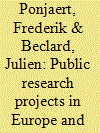

|
|
|
|
|
| Publication |
2010.
|
| Summary/Abstract |
The projects discussed in this paper, Galileo and ITER, are two contrasting experiences of Euro-Asian cooperation within Very Large (Public) Scientific Enterprises. They offer key insights into the deepening relations which have given shape to the rapidly expanding field of Euro-Asian collaborative interregional projects. Cooperative agendas within such "Big Science" endeavors heighten the question of the political considerations supporting the decision to engage specific forms of international cooperation. As the main driving force behind both projects, the EU's choices have resulted in the establishment of novel and distinct forms of Euro-Asian scientific cooperation. A better understanding of how such Euro-Asian initiatives emerge can logically be garnered by confronting the Euro-Chinese cooperation within Galileo, and the Euro-Japanese partnership within ITER. This comparison will show that the agendas and institutions of these two interregional policies vary greatly. Within the same policy field - in casu Large Scientific Projects - and in relationship to the same region - i.e. East Asia - this study shows that fundamentally different policies are practiced side-by-side. If in both cases Euro-Asian scientific cooperation has provided its participants with renewed leverage and unprecedented opportunities, the exact scope and function of these interregional collaborations range from the merely tactical in the Euro-Chinese Galileo experience, to the substantial in the Euro-Japanese ITER experience.
|
|
|
|
|
|
|
|
|
|
|
|
|
|
|
|
| 11 |
ID:
153139
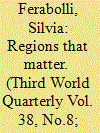

|
|
|
|
|
| Summary/Abstract |
This article critiques interregionalism as a concept that is trapped in the European Union (EU) foreign policy toolkit narrative, which in turn structures what can be said meaningfully and legitimately about interregionalism. Drawing on the experience of the Arab–South American (ASPA) Summit, it shows that, when speaking on interregionalism in International Relations (IR), one need not be speaking about the EU interregional model, which is understood as a vertical relationship established between the EU and an objectified regional partner of its choice. Rather, a broader definition for interregionalism is proposed, one that builds up from the basic ‘region-to-region’ dialogue–arrangement–cooperation and interrogates the meaning it has for those who engage in this practice. This was made possible by the construction of a framework for the analysis of the practices that lead to the materialisation of the ASPA interregional discourse and that reveal how this form of interregionalism in the Global South ‘matters’ in IR.
|
|
|
|
|
|
|
|
|
|
|
|
|
|
|
|
| 12 |
ID:
151316


|
|
|
|
|
| Summary/Abstract |
From 1991 until 2012, the European Union (EU) applied sanctions on Myanmar with the purpose of promoting democracy and human rights. In addition, the EU called on the Association of Southeast Asian Nations (ASEAN) to exert pressure on Myanmar. This paper analyses, in the context of Myanmar’s 1997 accession to ASEAN, how the EU’s sanctions approach towards Myanmar was perceived within ASEAN and related repercussions of this approach on ASEAN–EU interregional relations. With the accession of Myanmar as the base story, it is argued that a regional organizations membership concept implies specific dealings with normative ideas such as democracy and human rights as well as strategies of punishment such as sanctions. The differing membership concepts of ASEAN and the EU explain ASEAN’s critical perception of the EU’s sanctions on Myanmar. Further, the conceptual difference in membership also explains that the EU’s pressure on ASEAN has severely impaired the interregional relations.
|
|
|
|
|
|
|
|
|
|
|
|
|
|
|
|
| 13 |
ID:
086460
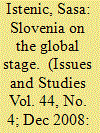

|
|
|
|
|
| Publication |
2008.
|
| Summary/Abstract |
After seventeen years of independence and successful integration into the European Union (EU) and the North Atlantic Treaty Organization (NATO), Slovenia is gradually establishing its role in the international community and proving its ability to act on the world stage. Recently, Slovenia successfully completed a term as president of the EU, the first of the 2004-2007 entrants to hold the presidency, thus proving that it is well-integrated into the workings of Brussels. Slovenia is an enthusiastic participant in a thriving European regionalism which has increased the EU's desire to become a more effective global actor in international security. The EU's emerging interaction with Asia has provided Slovenia with an opportunity to get involved in Asian affairs and take part in the enhancement of the EU's political and security role in the Asian region. The Taiwan Strait is a dangerous flash point that might trigger a war in Asia and have dramatic repercussions on the EU and its member-states. The EU has gradually awakened to the need to develop its own security perspective on China and to form its own approach toward the contentious cross-Strait issue. EU accession and Europeanization have given Slovenia increased weight and enhanced its ability to contribute to world peace.
|
|
|
|
|
|
|
|
|
|
|
|
|
|
|
|
|
|
|
|
|